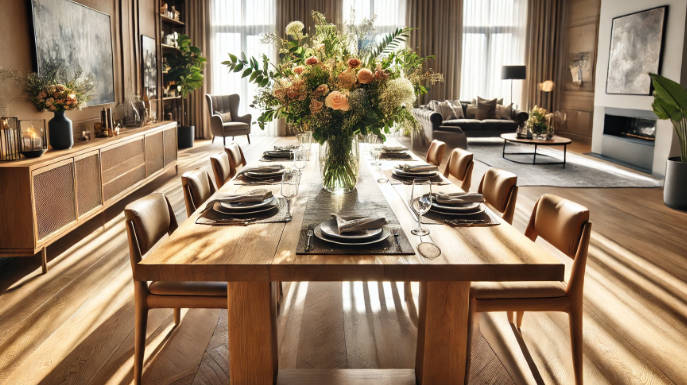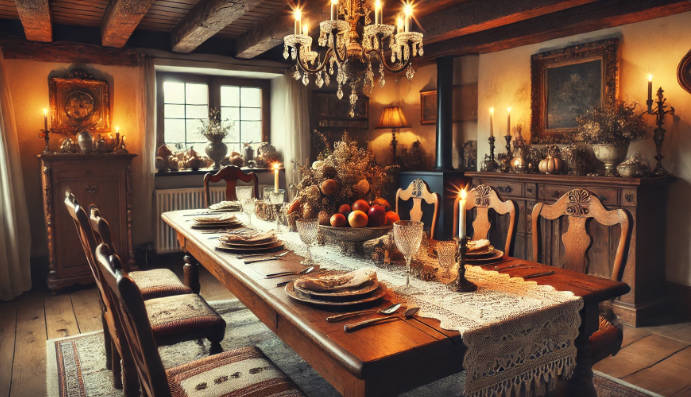How to Protect a Wood Dining Table for Longevity
Maintaining the beauty and functionality of a wood dining table requires proper care and attention. How to protect a wood dining table is a question that often arises, as everyday use can lead to scratches, stains, and other damage. This article will provide practical tips for shielding your table from potential harm, ensuring it remains a stunning centerpiece in your dining area. From preventive measures to repairing minor damage, learn effective strategies to extend the life and appearance of your cherished wood furniture.

Different Types of Wood Used in Dining Tables
Understanding the type of wood your dining table is made from is the first step in providing the best care. Different types of wood have varying characteristics and maintenance needs. Here are some common types of wood used in dining tables and how to identify them:

How to Protect a Wood Dining Table?
Wooden tables add a touch of elegance and warmth to any dining room. To keep your table looking beautiful and extend its lifespan, you need to protect it from potential damage. Here are some effective strategies to help you maintain your wooden dining table in top condition.
Protecting Wooden Furniture from Sunlight Damage
Sunlight can cause significant damage to wooden furniture. Prolonged exposure to direct sunlight can lead to fading, discoloration, and even warping of the wood. To prevent this, try to position your dining table away from windows that receive a lot of sunlight. If this isn’t possible, consider using curtains or blinds to block out the sun during the brightest parts of the day.
Maintaining Optimal Humidity for Wooden Tables
Humidity variations can affect wood. While too little moisture might result in splitting and cracking, too much moisture can cause the wood to swell and warp. To protect your wooden table, aim to keep the room’s humidity between 50% and 55%. You can use a humidifier or dehumidifier to maintain the proper level, depending on your climate and the season.
Using Tablecloths and Placemats for Protection
One of the simplest ways to prevent damage to your wooden table is by using a tablecloth or placemats. These provide a protective barrier against spills, scratches, and heat. Choose a tablecloth that complements your decor, and make sure it’s made of a material that’s easy to clean. Placemats are also a great option, as they protect the table while still showing off its natural beauty.
Adding a Glass Top for Enhanced Protection
Adding a glass tabletop is another effective way to protect your wooden table. A glass top shields the wood from scratches, spills, and heat, while still allowing the natural grain and color of the wood to shine through. Glass tabletops are easy to clean and maintain, making them a practical choice for busy households.
Using Trivets to Prevent Heat Damage
Hot dishes can cause serious damage to wooden tables, including heat marks and scorch marks. To prevent this, always use trivets when serving hot food. Trivets come in a variety of materials, such as wood, metal, and silicone, and they provide a safe surface for hot pots and pans.
Using Coasters to Prevent Drink Rings and Water Marks
Drinks can leave unsightly rings and water marks on a wooden table. To avoid this, always have coasters available for your family and guests to use. Coasters provide a barrier between the glass and the wood, protecting the table from condensation and spills.
Proper Cleaning Techniques for Wooden Tables
Proper cleaning is essential for maintaining the beauty of your wooden table. However, harsh chemicals can damage the wood’s finish and cause it to deteriorate over time. Instead, use mild cleaning products specifically designed for wood furniture. A gentle cleaner will effectively remove dirt and grime without harming the wood.
Using Furniture Covers for Extended Protection
Furniture covers are an excellent way to protect your wooden table when it’s not in use. Covers shield the table from dust, scratches, and other potential damage. They are particularly useful if you plan to store the table for an extended period. Choose a cover that fits well and is made of a breathable material to prevent moisture buildup.
Practical Tips for Repairing Minor Damage
Taking care of minor damage to your wooden table top can help maintain its beauty and extend its lifespan. Let’s look at some practical tips to handle common problems effectively.
Handle Spills and Prevent Stains Immediately
Spills can cause stains and damage the finish of your wooden table. It’s essential to clean up any messes as soon as they occur to prevent permanent damage. Use a soft, damp cloth to wipe away the spill, and then dry the area thoroughly to avoid moisture penetration.
Remove Water Rings
When you notice a water ring on your furniture early on, you can often remove it by drying the area with a hair dryer. This method uses gentle heat to evaporate the moisture before it can cause lasting damage.
Set your hair dryer to medium heat and hold it about 10 centimeters away from the stain. Move the dryer in slow, steady side-to-side motions. Within a few minutes, you should see the water ring begin to fade. Continue this process until the mark is completely gone.
Fix Scratches with a Wax Crayon
For minor scratches, filling them with wax is a quicker and easier solution. Furniture repair wax crayons are perfect for this job. They contain additives that enhance their durability, and you can usually find a color that matches your furniture perfectly. Additionally, these crayons are non-toxic, making them safe for surfaces that come into contact with food.
First, clean and dry the scratched area. Then, rub the wax crayon over the scratch to fill it in. Remove any excess wax with a plastic spatula or a credit card, and polish the area with a soft cloth to finish.
Conclusion
Protecting and repairing a wood dining table ensures it remains a beautiful centerpiece in your home for years. Regular cleaning with appropriate products maintains its luster and longevity. For minor damage, like scratches or stains, simple repair techniques can restore its appearance. Learning how to protect a wood dining table in the article and incorporating these tips into your routine will preserve its elegance and functionality, keeping it in pristine condition.
FAQs
Can I use any polish on my wood dining table?
To safely clean your wood dining table, use a water-based polish. Avoid products with silicone, wax, or ammonia, as they can damage the wood.
How do you protect an untreated wood table?
To protect an untreated wood table, apply a protective oil and allow it to dry thoroughly. This helps seal the wood, preventing moisture damage and enhancing durability.
